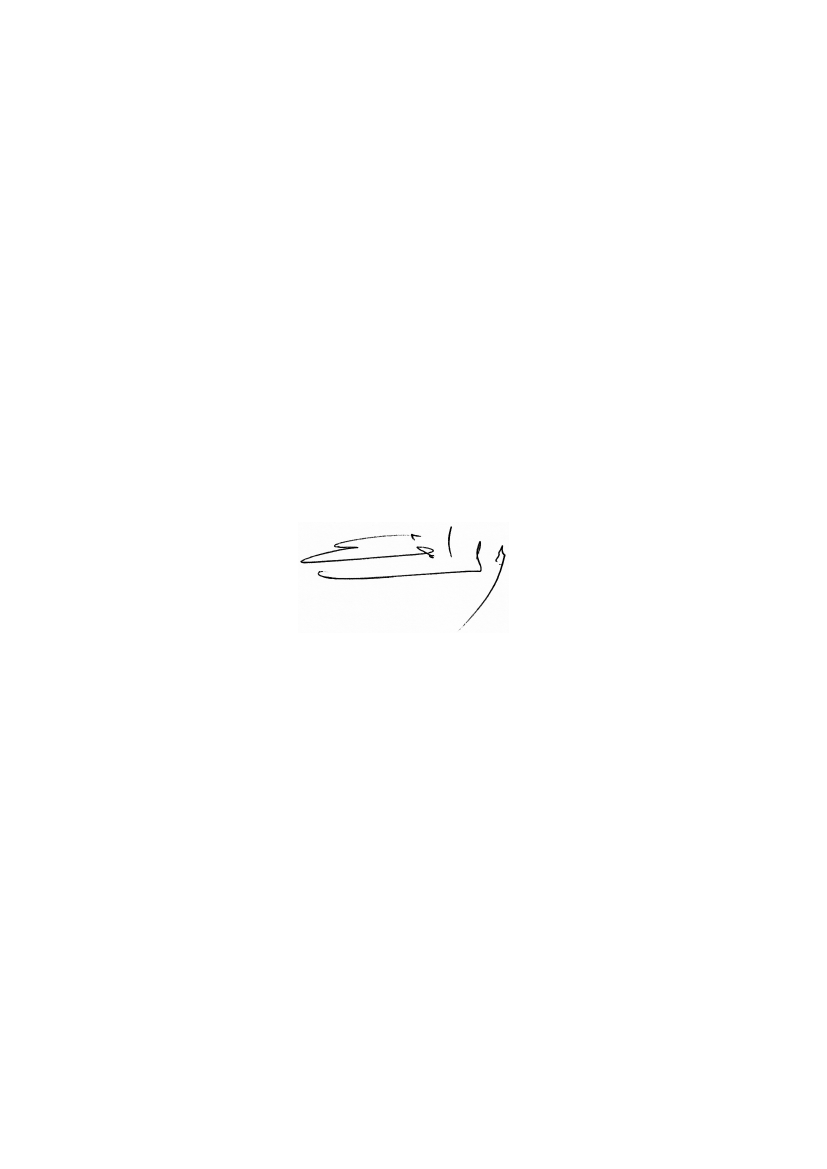Udenrigsudvalget 2012-13
URU Alm.del Bilag 84
Offentligt
INTER-PARLIAMENTARY UNIONPresidentChemin du Pommier 5Case postale 3301218 Le Grand-Saconnex / GenevaSwitzerlandTel.: +41 22 919 41 50Fax: +41 22 919 41 60E-mail: [email protected]
UNION INTERPARLEMENTAIREPrésidentChambre des ReprésentantsB.P. 431RabatMarocTél. : +212 537 679 527 / 756Fax : +212 537 760 851Courriel : [email protected][email protected]
21 January 2013Toward a new development vision: the emerging global debate and IPU preparationsDear Madam President,Dear Mr. President,I am writing to enlist your Parliament’s support and involvement in the design of the internationaldevelopment framework that will be put in place in 2015.As I am sure you are aware, the Millennium Development Goals are drawing to a close two years fromnow. As the international community makes a last push to reach the MDGs, it is also embarking on acourse to chart a new set of Sustainable Development Goals.The MDGs were largely a product of the United Nations and its member States and they did not includeall dimensions of development. This time there is a determined effort to consult more widely and toconsider all aspects of development. The IPU has defended the view that parliaments should beconsulted and the UN General Assembly endorsed these sentiments last year when it formallyencouraged the IPU to bring a parliamentary contribution to the design of the next generation of globaldevelopment goals.I believe you will agree that democratic principles, values and institutions should underpin the post-2015 development framework. Many of today’s shortcomings in sustainable development can in largemeasure be ascribed to a lack of representation, participation, transparency, effective decision-makingand oversight. Taken together, these values strike at the core of what is commonly referred to as“democratic governance.”The IPU has set forth its own vision of democracy on many occasions. We affirm that democracy is auniversally recognized ideal and goal that seeks to preserve and promote the dignity and fundamentalrights of the individual, to achieve social justice and to build sustainable development. Democracy isalso a mode of government that is founded on the right of everyone to take part in the management ofpublic affairs. In the view of the IPU, democracy requires equality between men and women and theirfull participation in society. It also requires well-functioning democratic institutions.There is therefore no question in my mind that the IPU must defend the notion that democracy shouldbe part of the new development framework in one form or another. At last year’s United NationsConference on Sustainable Development (Rio+20) governments, made it clear that “to achieve oursustainable development goals we need institutions at all levels that are effective, transparent,accountable and democratic”. I believe that it is precisely on this ground that the IPU position in theupcoming debate must begin to be built so that a clear commitment to democratic governance – bothas a standalone goal and as a dimension of other goals - will be reflected in the new SustainableDevelopment Goals.
I very much hope that you will wish to support this proposal and to facilitate participation by yourparliament in the consultations that are now underway. In order to facilitate your task, I enclose a Notethat succinctly outlines the different processes that have been launched at the national, regional andglobal levels. I am currently in contact with the High-level Panel that has been set up by the UnitedNations Secretary-General, and the IPU is organizing a round table discussion with members of thepanel at their next meeting in Monrovia at the end of this month. I enclose a Note containing our initialsubmission to these global consultations.I encourage you to make sure that your parliament participates in the national and regionalconsultations that are taking place. I would also like to suggest that you consider taking part in some ofthe regional consultations, in particular the one that will take place in South Africa at the end ofFebruary to discuss governance and development.I would be very grateful if you could keep the IPU Secretariat informed of any action you may take. Thisthwill help us better prepare for the 128 IPU Assembly in Quito which offers us an opportunity toformulate a more elaborate IPU contribution to the global consultations.I am convinced that we have a unique opportunity to influence the new sustainable development goalsand that by working together we can help ensure that democracy becomes part of the newinternational development framework. I believe this is fully in line with IPU’s strategy which invites usto work together to advance democratic culture, values and institutions throughout the world.Yours sincerely,
2
Abdelwahad RadiPresident of the Inter-Parliamentary Union
3NOTE ON OPPORTUNITIES FOR PARLIAMENTS AND THE IPU TO CONTRIBUTETO CONSULTATIONS ON THE POST-2015 DEVELOPMENT FRAMEWORKParliamentary input at the global levelLeading the way in the global mobilization, aHigh Level Panelof some 27 eminent personalities wasconstituted last fall to advice the United Nations Secretary-General on the broad contours of the newdevelopment framework. The panel is chaired by the Presidents of Indonesia and of Liberia togetherwith the Prime Minister of the United Kingdom. It will conclude with a major report in May that isexpected to provide overall direction to intergovernmental negotiations later on. The IPU has beeninvited by the HLP to organize a special roundtable with a few members of parliament at an upcomingmeeting of the HLP in Monrovia on 30 January. This will be a first important opportunity for the IPU toput forward a perspective on democratic governance and to gauge the ways in which it may be includedin the final conclusions of the Panel.AWorking Groupof some thirty member States will be set up within the United Nations GeneralAssembly to begin to sketch out the new SDGs. The Working Group is to submit concrete proposals tothe General Assembly in September, when a specialHigh Level Meetingof heads of government willtake place in New York. The meetings of the Working Group will be open thus offering opportunities forthe IPU to follow closely the deliberations and to contribute to them on the basis of recommendationsformulated by the IPU over the years.There will be severalregionalandthematic consultationsassisted by the United Nations in cooperationwith parliaments, civil society, academia, and the private sector. At the regional level, threeconsultations with MPs and civil society were already organized, partly with IPU support, in Africa andAsia. Global level consultations are taking place around eleven thematic clusters that include one on1governance. The IPU is taking part in the governance cluster that will culminate with a major event inSouth Africa toward the end of February. The consultation aims to help define the specific componentsof governance that will be particularly important to the new development framework and formulate ameasureable goal and corresponding targets. More information about all regional and thematicconsultations, which for the most part will run to the end of March, can be found online athttp://www.worldwewant2015.org/.An important opportunity for the IPU to engage in this global process will also come with our128Assembly in Quito(22-27 March). The main theme of the Assembly -From unrelenting growth topurposeful development “Buen Vivir”: New approaches, new solutions –very clearly calls for a broaddiscussion about the very purpose of development and how this should be achieved. To facilitate thisdiscussion, a few personalities and experts have been invited to deliver keynote addresses that will alsofocus on the linkages between development and democratic governance. The IPU will also conduct asurvey of delegates on this topic during the five days of the Assembly and the results will be presentedand discussed at a workshop on the last day.This year’s annualParliamentary Hearing at the United Nations,in November, will examine theproposals that will have emerged and provide MPs with an opportunity to discuss them withgovernment representatives and UN officials. While the overall parameters of the new developmentvision will likely have been set by the time the Hearing takes place, there is likely to remain quite a bit ofnegotiating flexibility with respect to the specific goals and particularly their targets and indicators.th
1
The full list of thematic consultations include: inequalities; health; education; growth and employment; environmental sustainability governance;conflict and fragility; population dynamics; hunger, food and nutrition security; energy and water.
Parliamentary input at the national level
4
The process leading up to the post-2015 development framework is also designed to gather the viewsof stakeholders from the ground up both institutionally and in their individual capacities. At themoment, broad-basednational consultationsare being organized in some 66 countries with theassistance of the United Nations, but many more countries may eventually be involved. Although eachcountry is free to organize its own consultations (through a combination of hearings, local town hallmeetings, workshops, citizens’ surveys etc.), the idea of these exercises is to engage as many people aspossible from all sectors of society. As a result of an explicit IPU request, the official guidelines for thenational consultations now clearly identify parliament as a stakeholder to be consulted in every country.Parliaments are encouraged take part in one form or another in national consultations taking place intheir country. More information on these consultations (including the official guidelines and contactdetails of the UN coordinator in each participating country) is available athttp://www.worldwewant2015.org/sitemap.Participation in the consultations at both national and global levels will also be possible through anonlineinteractive surveycalledMy World.This survey asks respondents to select their topdevelopment priorities from a list of sixteen items that have been identified through a series of focusgroups. Requiring only seconds to complete, the survey has been designed so that decision-makers andordinary citizens at large can express their views immediately from wherever they are and through avariety of means (smart phone; SMS message; computer etc.). The opinions collected throughMyWorldwill be channelled to the High Level Panel and the other processes outlined above.It is suggested that the survey, which is available in many languages, be brought to the attention of allmembers of parliament. In practical terms, it should be possible to post the electronic link to the surveyprominently on each parliament’s website, circulate information about the survey to all members withan exhortation to participate, and encouraging them to promote the survey with their ownconstituents. The survey can be found online athttp://www.myworld2015.org/.




